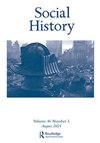We Are the Land: a history of Native California
IF 1.1
1区 历史学
Q1 HISTORY
引用次数: 7
Abstract
and its favouring of free settlers; displacement and genocidal mass slaughter of the native population became the rule. Modern Australia as we know it began not in 1788, but in the third decade of the nineteenth century. Karskens describes many occasions when aborigines and settlers hunted, worked and lived together, native children were adopted, and aborigines worked for wages in kind on settlers’ farms. Until the 1820s, governors frequently pardoned (‘emancipated’) suitably qualified convicts and granted them land. But within three decades the rights of convicts had been reduced to those related to their condition as people in servitude. As Alan Atkinson put it, the status of convicts became more strictly defined than had been the case, first in the American colonies and then, after the American Revolution, in New South Wales and other Australian colonies (‘The free-born Englishman transported: convict rights as a measure of eighteenth-century empire’, Past and Present, 144, (1994) 88–115). Karskens’ learned, lucid book is an inspiring example of how history should be written.我们是土地:加州原住民的历史
以及对自由移民的支持;对当地居民的流离失所和种族灭绝式的大规模屠杀成为常态。我们所知道的现代澳大利亚不是在1788年开始的,而是在19世纪的第三个十年。卡斯肯斯描述了许多土著居民和定居者一起打猎、工作和生活的场景,土著儿童被收养,土著居民在定居者的农场里以实物工资工作。直到19世纪20年代,州长们经常赦免(“解放”)适当合格的罪犯,并授予他们土地。但在三十年之内,囚犯的权利已经减少到与他们作为奴隶的状况有关的权利。正如艾伦·阿特金森(Alan Atkinson)所说,囚犯的地位变得比以往更加严格,首先是在美国殖民地,然后,在美国独立战争之后,在新南威尔士和其他澳大利亚殖民地(“自由出生的英国人运送:囚犯权利作为18世纪帝国的衡量标准”,《过去与现在》,144,(1994)88-115)。卡斯肯斯这本学识渊博、思路清晰的书是一个鼓舞人心的例子,说明历史应该如何书写。
本文章由计算机程序翻译,如有差异,请以英文原文为准。
求助全文
约1分钟内获得全文
求助全文
来源期刊

Social History
HISTORY-
CiteScore
1.10
自引率
0.00%
发文量
37
期刊介绍:
For more than thirty years, Social History has published scholarly work of consistently high quality, without restrictions of period or geography. Social History is now minded to develop further the scope of the journal in content and to seek further experiment in terms of format. The editorial object remains unchanged - to enable discussion, to provoke argument, and to create space for criticism and scholarship. In recent years the content of Social History has expanded to include a good deal more European and American work as well as, increasingly, work from and about Africa, South Asia and Latin America.
 求助内容:
求助内容: 应助结果提醒方式:
应助结果提醒方式:


